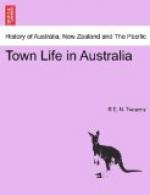A distinguishing feature of Victorian public life is the existence of an approach to definite political parties bearing the same names and starting originally from the same bases as in England, though their principles by no means correspond to those of English Liberals and Conservatives. The main factor which led up to these divisions was class dislike, embittered by the remembrance that both plutocracy and democracy started in life on an equal footing. The diggings caused a general shaking up of the social bag, and the people who came out uppermost were mostly those who had been lowest before. In matters political they grabbed the public lands wholesale; socially they flaunted their wealth more openly than was wise. Du haut en bas came badly from those who had only a few years ago been hail-fellows-well-met. On the other side was jealousy, embittered often by a feeling that it was a man’s own fault that he had not got on better in the world. The change had been brought about too suddenly to allow of people shaking down into their new positions. In this state of public feeling demagogues were not slow to see their advantage. They fanned the flames of discontent and jealousy till they broke out in Mr. Berry’s ‘platform,’ the bursting-up of the landed estates, reform amounting to revolution, protection ad absurdum, and so forth.
For a short time feeling ran so high over the Reform Bill, as almost to threaten civil war. One minister talked of settling the question with ‘broken heads and flaming houses.’ Another boasted at a public meeting that he had ’got his hand upon the throat of capital’—all bombast, of course, but dangerous bombast at a time of great public excitement. Happily a vent was found for these angry passions in the ridiculous incident of Mr. Berry’s ‘embassy’ to the Colonial Office, which set both parties laughing, and after three years of turmoil which had led to considerable commercial distress, everybody got tired of agitation.




